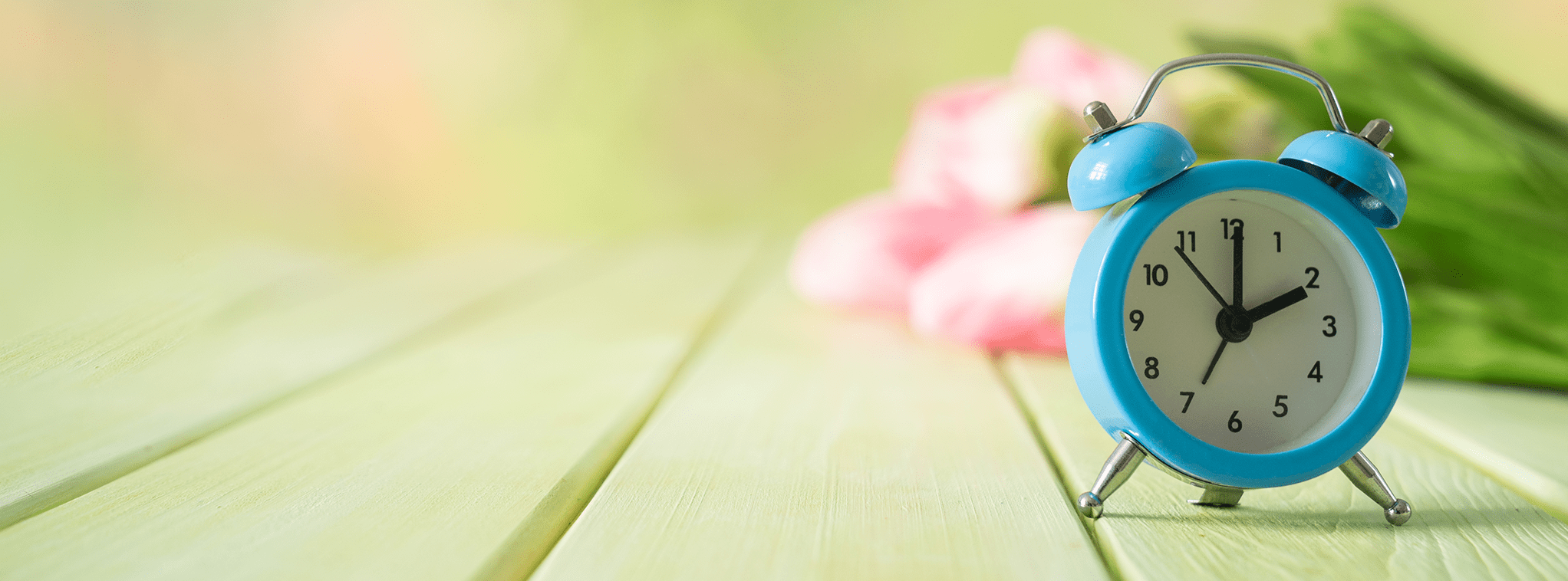Daylight Savings Time begins in the spring and gives us an extra hour of daylight in the evening. That extra time at the end of the day before it gets dark is something many look forward to all winter, but it can also affect our concentration and both our physical and mental health. Here are four tips to make sure the hour of sleep lost doesn’t affect your creativity and productivity as we prepare to spring forward.
Stick to a Routine

Losing an hour of sleep can throw your body off physically. Sudden changes in circadian rhythm cause a higher risk of sleep disorders, heart attacks, and strokes. A study by Open Heart, notes that the day after Daylight Savings Time in the Spring saw a 25 percent increase in heart attacks.1 Other physical results of the change in time are fatigue and cluster headaches.
Sticking to a routine before and after Daylight Savings Time is the best way to limit the impact it has on your body. Having a set schedule also helps your internal clock adjust to the new time. Start getting ready for the clocks to spring forward by going to bed 15 minutes earlier each night the week before. By the time you have to set your clocks forward an hour, your body will have had a chance to get ahead on sleep.
Other routines to pay attention to around Daylight Savings Time include when you eat, drink and exercise. Finish eating or drinking about two to three hours before bedtime. Digestion wakes up the body, so if you eat too late it can cause restlessness. Working out may leave you physically tired, but it wakes up your body as well. End your workout two hours before you head to bed so your body can wind down.
Fuel Your Body

Healthy eating is important every time of year, but it’s especially important when you lose an hour of sleep. To get the best sleep and stay alert and creative the next day, avoid caffeine or alcohol four to six hours before bedtime. Eating proteins, fruit and vegetables can also help maintain a clear mind. Sticking to a routine as noted can help you make better decisions about nutrition. When the time changes, the grogginess can lead to carbohydrate cravings which in turn can make you feel even more sluggish. Preparing meals ahead of time or having a stocked fridge with healthy foods will make it easier to eat foods that improve your mental abilities.
Get Moving

Exercise and moving your body throughout the day helps to sleep more soundly at night. When adjusting to Daylight Savings Time, it’s even more important. Working out in the morning can help your mind and body stay alert throughout the day. To stay focused even when you lose an hour of sleep, try to get exercise first thing in the morning, even if it’s just a walk around the block.
Another important factor in staying energized after the clocks change is getting enough exposure to natural light. The bright sunlight will alert your body to stay awake. Taking a few, short trips outside can help fight the urge to crawl back into bed.
Turn off the phone when it comes time to call it a night. The light from electronic screens reduces the natural melatonin in your body that triggers sleep. Just like preparing a change in your sleep routine, reduce the use of your phone or television the week before Daylight Savings Time.
Although, there are apps that can help you sleep soundly and get your creativity flowing the next day. These apps don’t require you to look at the screen but focus more on listening. Try downloading meditation apps like Headspace or listen to a sleep podcast like Deep Sleep Sounds. Another addition to your bedroom that could help you adjust your sleep schedule is a sunrise simulation alarm clock. These can help your body wake up from simulated natural lights and sounds.
The extra hour at the end of the day is a welcomed change with Daylight Savings Time. To fully enjoy the extra time and remain alert and creative throughout the day, use these tips to prepare your body for when the clocks switch.
